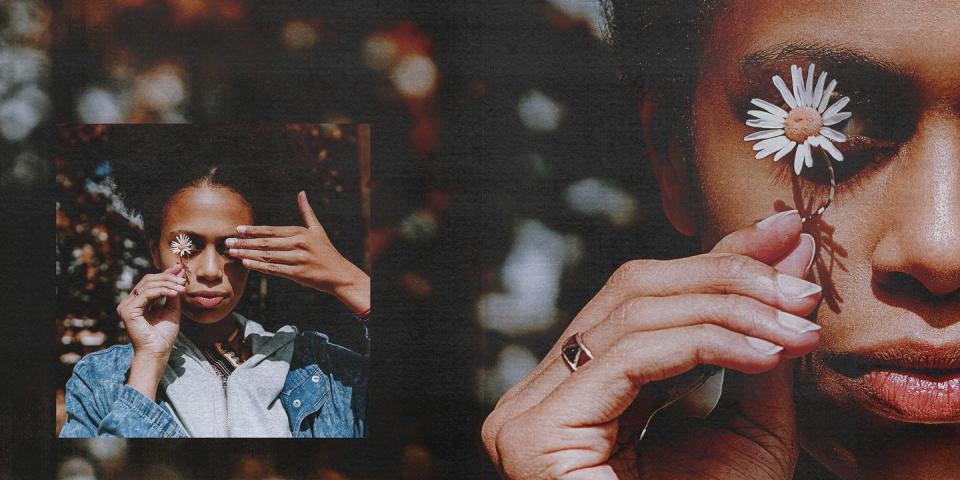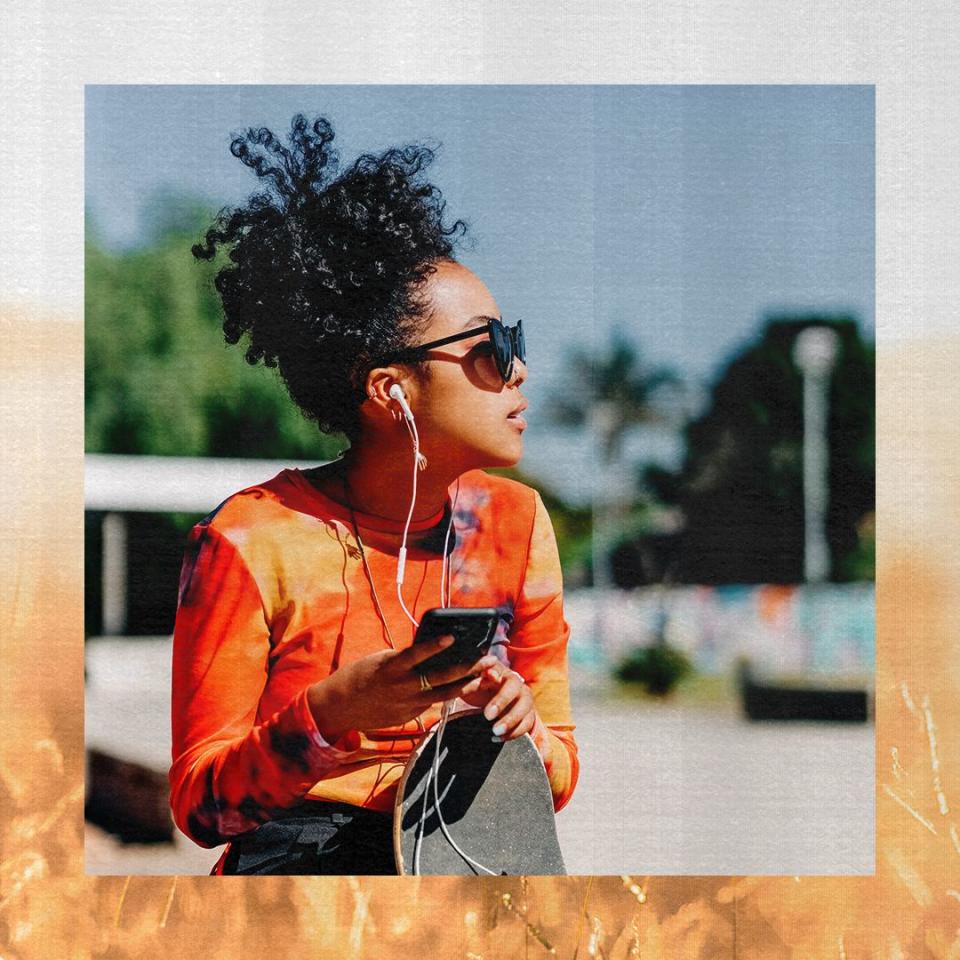Why are Black children forced to grow up faster than their white friends?

I had a wonderful childhood, but in many ways, it ended too soon. Far sooner than it did for my white friends. I was around 9-years-old when my mum first began teaching me how I'd need to operate in the world in order to stay safe – mostly regarding how I interacted with men and boys. She taught me to be hyper aware of my surroundings at all times and to avoid spaces occupied by mostly males. I was rarely allowed to go to sleepovers; I only got the green light if my mother knew the parents really well and trusted there wouldn’t be any men (including older brothers, or even fathers) close to us, as we listened to Girls Aloud and braided each other's hair.
Even the way I interacted with the men in my own family had to change, seemingly overnight. Sitting on my dad’s lap went from adorable to inappropriate. I was told to cover up and be aware of what I was wearing in front of uncles and cousins.
That’s when the fury started brewing. I hated this forced maturity I had to inhibit. It felt scary, confusing, and unfair – and it didn't seem to be happening to my white peers.
I didn’t learn until recently, but those shifts I experienced were thanks to something called 'adultification'. Co-founder and director of Listen Up, a child protection and policy organisation, Jahnine Davis, explains that the term refers to “a form of bias where [some] children are perceived to be more adult-like.” And it disproportionately affects Black youths. In its worst form, there are even cases of Black children being harmed or killed because of adultification. One prime example of this? New statistics show of the 600 children forced to undergo “intrusive and traumatising” strip searches, conducted by the Met Police over the last two years, 58% were described by the officer as being Black. Over 95% of the searches were on boys.
“Adultification can also impact children mentally due to missing out on formative milestones in adolescence, it can harm their ability to make and maintain healthy relationships with others,” Sharnade George, psychotherapist and Founder of Cultureminds Therapy, explains. “Not being seen as the child you are can make you feel less than, which in turn can impact you emotionally, physically and mentally, making you feel ignored and disregarded.
“In the long term this can lead to depression, anxiety, low self-esteem and trauma, as their innocence and vulnerability is erased.”
So, why isn't anybody talking about it? And how do we begin to stop this being our reality?
One recent case showing the adultification of Black girls, and which caught a lot of media attention, was that of 'Child Q' — a 15-year-old who had to endure an inappropriate police strip-search at her Hackney secondary school. The story and follow-up report were tough to read. Teachers called the police because they believed the teenager had brought drugs onto the premises because she “smelt of cannabis” (she was later found to have nothing on her person).
Two female officers arrived at the school and took Child Q into a medical room and made her “bend over, spread her legs and use her hands to spread her buttocks while coughing” without an “appropriate adult” present. To make matters worse, Child Q was on her period at the time.
Reports say the teen has changed irrevocably since the incident, and her aunt has stated “the family do not believe officers would have treated a Caucasian girl child in the same way... Child Q was racially profiled due to her being black and her extremely large head of locks”.
Sadly, Child Q's experience is not an isolated incident though (as the earlier mentioned Met Police statistics show, plus other data revealing 53% of all the underage strip-searches resulted in no further action); whilst it is an extreme example of how Black children can be unjustly singled out or viewed through a more 'adult' lens by the world around them, including by those meant to protect (such as teachers and the emergency services), other major and microaggressions happen on a day-to-day basis.
Adultification manifests in tons of different ways. I'm 'lucky' enough to have only endured a few instances where I was devalued and hypersexualised, but I managed to make it through my youth physically and (relatively) emotionally unscathed. But other Black people aren't as lucky.
For Black boys, it’s criminal exploitation
Some people in law enforcement display bias and appear to assume Black boys are criminals and threats to society, an issue Davis tells me is called 'child criminal exploitation' – which is at the root of some police officers' violent behaviour to young Black boys.
“Child criminal exploitation is the exploitation, coercion and grooming of children into criminal activity,” she explains. “It can take various forms, however children who are criminally exploited are often treated as criminals rather than children in need of support. It brings into question how children who experience this form of harm are at a heightened risk of a criminal justice approach, instead being given the welfare support [that could change and improve their lives].”
Child C was in need of a welfare response, but instead, he received a violent and ultimately fatal one. His case, which Davis investigated and discussed in a report about the cost of ‘adultification’ in safeguarding responses to Black boys, didn’t make headlines, but what happened to him at the hands of police still matters.
Back in 2019, Child C was “deliberately knocked off a moped and then stabbed repeatedly” to his death in Waltham Forest. Though authorities claim that his murder was unpredictable, a Serious Case Report (SCR) of the incident said adultification and child criminal exploitation led to Child C’s death.
Throughout his life, Child C had several run-ins with the police. When he was 13-years-old he was stopped by police officers, who found him ‘to be in possession of an air gun [and] a large “Rambo” style knife in a sheath on his waistband’. Instead of getting the help and support he needed, he was immediately deemed a dangerous criminal rather than what he probably was; a scared and lonely kid.
In the report, it says that “at the time of his death, due to delays in housing decisions, Child C was not living with his mother, but sleeping on his grandmother’s sofa.” He hadn’t been in school for over a year. Child C was neglected by the system, and leaving him in that situation kept him in danger, and ultimately led to his death.
This dangerous exploitation happens abroad as well. Back in 2014, the world was shocked when the killing of Tamir Rice made headlines. He was just 12 when he died at the hands of Timothy Loehmann, a 26-year-old white police officer. Rice was carrying a replica toy gun, and Loehmann shot and killed him, almost as soon as he arrived on the scene.
The fear these kids must have faced is unfathomable.

I remember being afraid of my own body as it was developing in my early teens, after realising that men felt an ownership over it. “Black girls are more likely to be seen as “hyper sexualised”, the “jezebel”, loud and innately resilient,” Davis explains. And it happens much earlier than you think.
One study found that Black girls are viewed as “more adult-like” from the age of five, and that increased when they're 10 to 14. At that age range, they’re considered “more mature, more sexually aware and less innocent,” and not just by non-Black people, but within the Black community as well.
It’s something Jaylene Mbararia, who was born in Kenya and grew up in Oxfordshire, knows well – and tells me is especially present in African households.
“I think it’s pretty common to think of adultification as something that only happens with strangers or amongst white peers, but it’s definitely commonplace in Black households too,” she explains. “It can be things like being told to “put more clothes on” if there was a male visitor, despite only being 10 or 11 years old, or the chores that were assigned specifically to me rather than my equally capable younger brother.”
Jaylene’s experiences are an everyday form of adultification of Black girls. Our family and others assume that we’re more mature and should take on a maternal role way before those expectations are placed on Black boys. We’re told we have to adjust our behavior to cater to the men in our lives, and it’s frustrating and not fair.
“At the time I remember wondering why I was being told to cover up in my own house,” Jaylene shares. “But now I realise what was happening, it was an issue of how I was being perceived. I was being perceived as someone other than the 10-year-old girl that I was, someone who could be sexualised or had a specific role within a household, as a grown woman.”
The fact that officers were all too quick to decide to inappropriately strip search Child Q, touching all over her body all while she was menstruating, shows how hypersexualisation and criminal exploitation can fuse. Child Q’s body was devalued and she was already seen as a criminal before being proved otherwise. And that’s left her navigating emotional damage that may follow her for the rest of her life.
The long-term impact is significant
There was so much I had to unlearn about my sexuality and my body after the hypersexualisation I faced growing up. And that effort is microscopic compared to what children who face more violent and invasive incidents of adulteration have to deal with.
It’s scary for parents of Black children, who are tasked with somehow preparing their kids for how the world may see them, and helping them heal. George says to parents that creating an environment where it's safe to talk is essential.
“Research if you’re not sure as a parent, educate yourself on this topic so you can help break the cycle,” she adds. “It's especially important to have a therapist who is culturally competent and who can [offer the right] techniques to help kids who have experienced adultification: recognise the issue, rediscover and redefine yourself, invest in self-care and time to heal.”
The adultification of Black children is a form of racism that’s deeply embedded into systems and structures designed to protect us, but often don’t, and according to Davis, the key to pushing forward is moving “away from questioning whether racism exists and instead question how its existence impacts on professionals, organisations and institutions, and can potentially deprive Black children the right to be protected.”
I’m still unpacking the way I was adultified in my youth and how it affected me as an adult. It’s a complicated effort, because I’ve only recently learned the language to describe what I and so many Black children experienced. But now we have those tools and the support to unlearn what the world has told us for centuries: that we’re not worth a full human experience.
Stopping the adultification of Black youth is just as complicated an effort. I don’t know what full reform looks like, but I do know after talking about it with Davis and George that knowledge and accountability is the first step. The more we tell stories about kids like Child Q, the closer we get to ensuring Black kids get to be just that — kids.
You Might Also Like

 Yahoo Finance
Yahoo Finance 